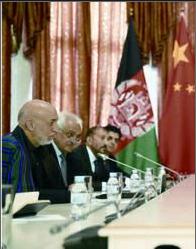A Pivotal Year for Afghanistan
2014-03-18ByLiQingyan
By+Li+Qingyan

With the impending large-scale withdrawal of NATO forces led by the United States in 2014, Afghanistan will usher in a vital turning point for its transition. The U.S.-Afghanistan Bilateral Security Agreement, the upcoming Afghan general election as well as the national reconciliation of Afghanistan will have a heavy influence on the countrys future transition.
The destiny of Afghanistan will be more closely tied with regional countries. As a neighbor of the Central Asian country, China hopes Afghanistan can manage the transition smoothly and is poised to play an important role in Afghanistans reconstruction.
Key factors
Thus far, Washington and Kabul are still betting on the bilateral security pact. As the pact concerns the independence and sovereignty of Afghanistan and the future position of the United States in the country, negotiations often came to a deadlock with major divergences between both sides. The immunity of U.S. soldiers and the right to search Afghan homes were the main points of contention. Though the two countries reached an initial agreement on the draft of the pact, which was approved by the Afghan parliament last November, Afghan President Hamid Karzai delayed the signing of the bill. Washington then threatened to withdraw all troops and terminate aid to Afghanistan.
For Karzai, while he wants more rights and interests for Afghanistan, he is also afraid to be mislabeled as having signed a traitorous treaty in the future. Therefore, it is unlikely that Washington and Kabul can improve their relations within the last months of Karzais tenure. Washington must then pin its hopes on the next president, but if it withdraws all troops, the turmoil in Afghanistan will escalate.
The troubled Central Asian country will hold its third general election since the fall of the Taliban regime in April with 11 candidates fighting for the presidency. Different political forces within the country are currently staging fierce competition. In addition to the security threat from the Taliban, Afghan people are concerned about election fairness and transparency given widespread fraud allegations in the 2009 election. If the election result fails to be recognized by most Afghan people, it could spark more civil unrest.
In the meantime, along with the U.S. troop withdrawal, Afghan security forces and police will assume the public security tasks of the nation independently. Whether they are capable of safeguarding the countrys security will be tested by counterattacks from the Taliban. Although NATO forces have weakened the Taliban in the last decade, its destructive effects on Afghanistans reconstruction cannot be underestimated. Currently, violent attacks from the Taliban have not decreased. Major facilities in Kabul and U.S. military bases are still the main targets of Taliban attacks.endprint
Hardliners of the Taliban in Afghanistan anticipate a “security vacuum” following the withdrawal of U.S. troops, while Taliban moderates prefer to negotiate with Kabul in a bid to seek greater political space in the country. Though Karzai has offered the Taliban an olive branch for peace talks more than once, complicated disagreements among the United States, the Afghan Government and the Taliban are difficult to reconcile. Peace talks are often met with repeated setbacks. Political reconciliation is urgently needed in Afghanistan, and it is essential to lasting peace and stability for the country.
Even though Afghanistan is known as the“graveyard of empires,” its geo-strategic value attracts many powers to extend their influence in the country. For the United States, the Barack Obama administration hopes on the one hand to end the war as soon as possible in order to focus on its “pivot to Asia” strategy; on the other hand, Washington doesnt want to give up its achievements in Central Asian countries in fighting terrorism and wishes to maintain a strategic fulcrum in Central Asia.
Meanwhile, Russia regards Central Asia as its traditional sphere of influence. As terrorism spreads to the north, drug smuggling becomes rampant, and the United States squeezes its sphere of influence in Central Asia, Russia is against the long-term stationing of U.S. troops in Afghanistan. Russia has also enhanced its own military presence in Central Asian countries in recent years.
Additionally, Afghanistan and Pakistan are closely linked with each other by geography and history. The national reconciliation of Afghanistan cannot bypass Pakistan, which has insisted that the Afghan Taliban should be accepted in the countrys political system to contend with the rising Indian influence in Afghanistan. India, however, has made efforts to strengthen ties with the Karzai administration, aiming to fill the power and security vacuum in Afghanistan after the U.S. troop withdrawal. The different strategic interests of other powers within Afghanistan have become another major barricade for the country to achieve lasting peace and stability.
Chinas role
China and Afghanistan are traditionally good neighbors. China has been participating actively in the postwar peace-building and reconstruction of Afghanistan. The two neighbors are connected not only by mountains and rivers, but also by a common destiny. The peace and stability of Afghanistan is of great significance to the stability of Chinas western region and efforts to combat terrorism, separatism and extremism and drug trafficking.endprint
Firstly, turbulence in Afghanistan and Pakistan particularly threatens Chinas Xinjiang Uygur Autonomous Reign. The terrorist attacks launched in Xinjiang by the East Turkistan Islamic Movement in collusion with Al Qaeda and the Islamic Movement of Uzbekistan have severely affected the stability of the whole region.
Secondly, with the terrorists backflow to Central Asia and South Asia, drug trafficking and transnational crimes have become rampant. Drug smuggling in the Golden Crescent, with Afghanistan as its center, has increasingly penetrated into Chinas Xinjiang and Yunnan Province.
Thirdly, Afghanistan is rich in mineral resources and close to China geographically, which makes it very important for the diversification of Chinas resource suppliers.
Lastly, China is planning to further open to its western neighbors with the deepening of its economic reform and will strengthen cooperation with Central Asian countries. The new economic cooperation initiatives put forth by Chinas new leadership, such as the Silk Road Economic Belt, the 21st Century Maritime Silk Road, the BangladeshChina-India-Myanmar Economic Corridor as well as the China-Pakistan Economic Corridor, have provided significant opportunities for China and Afghanistan to expand cooperation.
Since an interim administration was established in Afghanistan in 2001 following the fall of the Taliban regime, the Chinese Government has rendered assistance to Afghanistan within its capability. China has provided much help in the construction of infrastructure projects in Kabul such as the National Center for Science and Education, and the Chinese Department building at Kabul University. China also provided intellectual support for the economic development of the country.
Chinese foreign direct investment in nonfinancial sectors in Afghanistan has reached nearly $500 million and projects contracted by Chinese companies in Afghanistan are worth almost $800 million. The China Metallurgical Group Corp.s Aynak copper mine project and the China National Petroleum Corp.s Amu Darya oil project are by far the largest foreign investment projects in the country. All these have shown Chinas sincerity to cooperate with Afghanistan and its confidence in the countrys future development. The value of the mutually beneficial cooperation between China and Afghanistan cannot be replaced.
In addition, the two sides have conducted various forms of cooperation in the fields of defense, security, and law enforcement. Cooperation in culture, education, public health and media continue to expand as well. Chinas development has created great opportunities for Afghanistans peace-building and reconstruction, and Chinas involvement has helped boost the self-development of the country.
China actively participates in international and regional cooperation on Afghan affairs. Against the backdrop of the planned withdrawal of NATO troops by the end of 2014, the changing situation in Afghanistan is closely related to regional peace and stability. The long-term stability and development of Afghanistan needs active participation and effective cooperation of the international community, especially countries in the region.
China supports Afghanistans efforts to strengthen good neighborly relations with other countries in the region. This year, it will host the Fourth Ministerial Conference of the Istanbul Process—a platform aimed at expanding coordination between Afghanistan and its neighbors and regional partners—in Beijing, embodying Chinas support for Afghanistans smooth transition and reconstruction as well as regional cooperation on the Afghan issue.endprint
